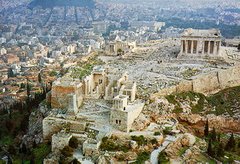Steiner at one point in his book describes conflicts as "non-negotiable." This seems to say that confrontations must exist, that tragedy is the only part of life that is sure and constant. It seems that this tragedy is only natural and must occur. If this
is true, then it seems that it will be perpetuated eternally. There is something in the fabric of humanity that propels, forces men and women to be in constant struggle with one another. There is something that forces ruled to rebel from ruler, from authority. Reading this, it appears that conflict may be the only substance from which the world is made.
This relates to the Four Noble Truths. The 1st truth states that life is suffering, or "life means suffering." It speaks of the physical and mental suffering that every person must go through. It also says that the root of this suffering is caused, at its root, by the incompleteness of life. This is the same as the five different conflicts mentioned in class--in this case, living vs. dead. This conflict is, of course, at the center of Antigone. Ultimately, Antigone's suffering is cause by death--the death of her brother. And this death perpetuates itself. In the end, Antigone's lover and his mother are dead, not to mention Antigone. It seems that death is the greatest of conflicts that life throws in one's path. It is the ultimate conflict, which no one can conquer.
Plato also describes this thought of unavoidable conflict when he speaks of knowledge fighting against ignorance.
Plato speaks, in his allegory of the cave, about the painful process through which a person must gain knowledge. He uses metaphor to describe this battle that occurs between truth and lies in the heads of every person.
Conflict, it seems, may be the only notion that is true in this world. It seems that conflict is unavoidable and unchangeable. Conflicts of the past fill the reality of the present.

No comments:
Post a Comment